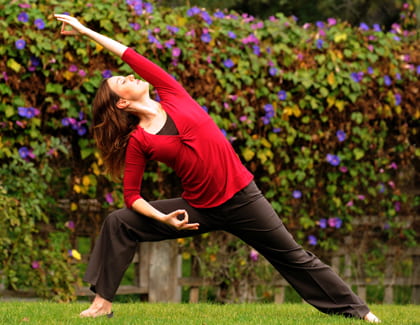Cruising toward calm
Shaky economy has more people turning to Dr. Toni Pusateri for help with anxiety

Worried about money? You’ve got company.
Eight in 10 Americans are stressed about their finances and the economy, according to a recent survey by the American Psychological Association.
Dr. Toni Pusateri, inpatient chief resident of psychiatry & human behavior at UC Irvine Medical Center and a yoga instructor, needs no survey to tell her people are fearful. She specializes in helping patients cope with anxiety – something she’s struggled with herself – and she’s been busy helping more people find calm in the financial storm.
Here, she talks about techniques she and her patients use to breathe easier.
Q: What affect is the financial crisis having on patients?
A: I’m seeing people in their 30s, 40s and 50s, who have never been to a psychiatrist before, expressing a great deal of fear about the economy. They’re terrified they’ll lose their jobs, their homes, and won’t be able to support their families.
It’s difficult to see so many people suffering. At the same time, it’s gratifying to be able to help them through these difficult times.
Q: What do you say to someone troubled by anxiety?
A: I say that no matter what’s happening in life, it’s important to focus on taking good care of ourselves. We talk about psychological, spiritual and physical factors, including caffeine use, sleep, basic nutrition, exercise, talking or writing about feelings, breathing, meditation and prayer. Each person has a unique way of finding balance.
Anxiety often is a state of fear about the future. I try to help patients focus on the present to take things one moment at a time. It’s also important to remember what is in our control and what is not. Some difficult life situations are beyond our control. What we can control is how we react to those situations. And bringing in a little bit of acceptance, gratitude and compassion for one’s self can go a long way.
Q: How do you help patients cope with the physical symptoms of fear?
A: It depends on the severity of symptoms and level of life impairment they’re experiencing. A variety of treatment interventions are available, including psychotherapy, medications and breathing exercises, and I often use a combination.
I think breathing exercises are underutilized in psychiatry, but can be quite effective for anxiety. When we’re anxious, breathing speeds up. Learning to slow the breath can shift us out of the fight-or-flight response and induce relaxation.
It’s best to practice breathing exercises regularly, not just when we’re anxious. I recommend first thing in the morning or before bed for a minimum of five minutes. I encourage people not to force anything, just find a quiet spot, set a timer and watch the breath.
A: What techniques do you use in your own life to reduce stress?
Q: I practice awareness meditation morning and night. Breathing and being present is the goal. Sometimes I feel really quiet inside. Other times, I catch myself thinking about things in the past or worrying about the future. When this happens, I remind myself to come back to the present and focus on the breath. It’s a continuing practice.
I also attend a meditation group twice monthly, which helps fuel my individual practice. Also, paying attention to my sleep, nutrition, exercise and personal relationships is extremely helpful for me in dealing with stress.
A: How did you develop your meditation practice?
Q: I started taking yoga classes in college to stay fit and ended up appreciating its deeper, philosophical side. Yoga has helped me be gentler with myself and less critical.
I taught yoga in medical school at the University of Nevada and continued teaching in Seal Beach after I came to UCI. I’m currently taking a break from teaching, and my work schedule doesn’t always allow for vigorous yoga practice, but I always have time to sit on my floor and breathe.
No matter what else is going on in my life, I can always find calm in the breath. It’s a way for me to feel connected to my spirit.
Q: What are the benefits of daily meditation?
A: For me, it’s emotional and spiritual well-being. It used to be difficult for me to sit still. Meditation helps me remember there’s a part of me that’s valuable for just being as I am.
Nature reminds me of this as well. When I look at the trees, flowers, mountains, I value them not because they are busy doing something, but just because they exist. It’s finding that place that feels peaceful.